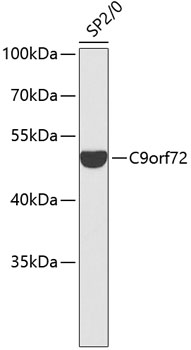-
Product Name
C9orf72 Polyclonal Antibody
- Documents
-
Description
Polyclonal antibody to C9orf72
-
Tested applications
WB
-
Species reactivity
Human
-
Alternative names
C9orf72 antibody; ALSFTD antibody; DENNL72 antibody; FTDALS antibody; FTDALS1 antibody; protein C9orf72 antibody
-
Isotype
Rabbit IgG
-
Preparation
Antigen: Recombinant protein of human C9orf72
-
Clonality
Polyclonal
-
Formulation
PBS with 0.02% sodium azide, pH7.3.
-
Storage instructions
Store at 4℃. Avoid freeze / thaw cycles.
-
Applications
WB 1:200 - 1:1000
-
Validations

Western blot - C9orf72 Polyclonal Antibody
Western blot analysis of extracts of SP2/0 cells, using C9orf72 antibody .Secondary antibody: HRP Goat Anti-Rabbit IgG (H+L) at 1:10000 dilution.Lysates/proteins: 25ug per lane.Blocking buffer: 3% nonfat dry milk in TBST.
-
Background
Component of the C9orf72-SMCR8 complex, a complex that has guanine nucleotide exchange factor (GEF) activity and regulates autophagy. In the complex, C9orf72 and SMCR8 probably constitute the catalytic subunits that promote the exchange of GDP to GTP, converting inactive GDP-bound RAB8A and RAB39B into their active GTP-bound form, thereby promoting autophagosome maturation. The C9orf72-SMCR8 complex also acts as a regulator of autophagy initiation by interacting with the ATG1/ULK1 kinase complex and modulating its protein kinase activity. Positively regulates initiation of autophagy by regulating the RAB1A-dependent trafficking of the ATG1/ULK1 kinase complex to the phagophore which leads to autophagosome formation. Acts as a regulator of mTORC1 signaling by promoting phosphorylation of mTORC1 substrates. Plays a role in endosomal trafficking. May be involved in regulating the maturation of phagosomes to lysosomes (By similarity). Regulates actin dynamics in motor neurons by inhibiting the GTP-binding activity of ARF6, leading to ARF6 inactivation. This reduces the activity of the LIMK1 and LIMK2 kinases which are responsible for phosphorylation and inactivation of cofilin, leading to cofilin activation. Positively regulates axon extension and axon growth cone size in spinal motor neurons. Plays a role within the hematopoietic system in restricting inflammation and the development of autoimmunity (By similarity).; Isoform 1: Regulates stress granule assembly in response to cellular stress.; Isoform 2: Does not play a role in regulation of stress granule assembly in response to cellular stress.
Related Products / Services
Please note: All products are "FOR RESEARCH USE ONLY AND ARE NOT INTENDED FOR DIAGNOSTIC OR THERAPEUTIC USE"
